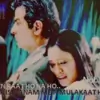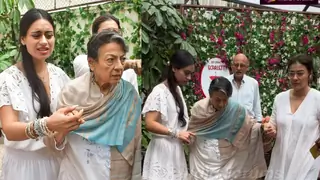Bhishma was a great archer and a warrior of peerless valour and courage.
His role in Mahabharat - the war -
He is the one who witnessed the Mahabharata completely from the beginning since the rule of the Shantanu.
In the great battle at Kurukshetra, Bhishma, bound by his oath to serve the ruler of Hastinapura, fought very reluctantly on the side of the Kauravas; nevertheless, he gave it his best effort. At one stage, his impeccable military prowess, combined with Arjuna's disinclination to fight him, almost made Lord Krishna break His vow of not actually fighting in the war. Krishna charged at Bhishma to kill him with a chariot wheel and was welcomed with folded hands by the grandsire. Then Arjuna pleaded with Krishna to stop and reminded him of the vow.
Bhishma was finally grievously wounded on the tenth day of the battle by Arjuna, who hid behind another warrior Shikhandi, and rained arrows on the grandsire. Bhishma knew that Shikhandi was born a woman and to strike a woman he deemed unworthy of the chivalrous. Thus, the warrior did not resist but merely remarked to Dushasana, "These are Arjuna's arrows, they cannot be Shikhandi's because they tear my flesh as a crab's young ones tear their mother's body." Of all of Duryodhana's commander-in-chiefs, Bhishma had held off the inevitable defeat the longest. He was the supreme commander of the Kaurava forces for ten days compared to Drona's five, Karna's two and Salya on the final day. Bhishma fell, his entire body resting on a pincushion of Arjuna's arrows. After that Drona become the Commander-in-Chief of Kaurav army. After his demise Karna replaced him. Soon after this, Karna, who in the face of Bhishma's criticism had sworn his vow to keep out of the Kurukshetra till the withdrawal of Bhishma, approached the grandsire to seek his blessings. Bhishma reveals to Karna that he always knew the truth of the latter's parentage and implored him to persuade Duryodhana (at this point he also told Karna that he had not allowed to fight him under his command as he did not want the real brothers to fight with each other) to end the carnage that had already resulted in such great slaughter. Upon Karna's refusal and insistence to remain true to Duryodhana, he nevertheless received the grandsire's blessing. He lay on the 'bed of arrows' till the end of the battle, and chose to die only after learning that the Pandavas had won, as he was now assured that the throne of Hastinapura was in safe hands. In his last days before he ascended to heaven, he recited to Yudhisthira the famous hymn to Vishnu, the Vishnu sahasranama. Bhishma also admitted he had been wrong to fight for Duryodhana even though he was the king's employee since one's only allegiance is towards righteousness.





























